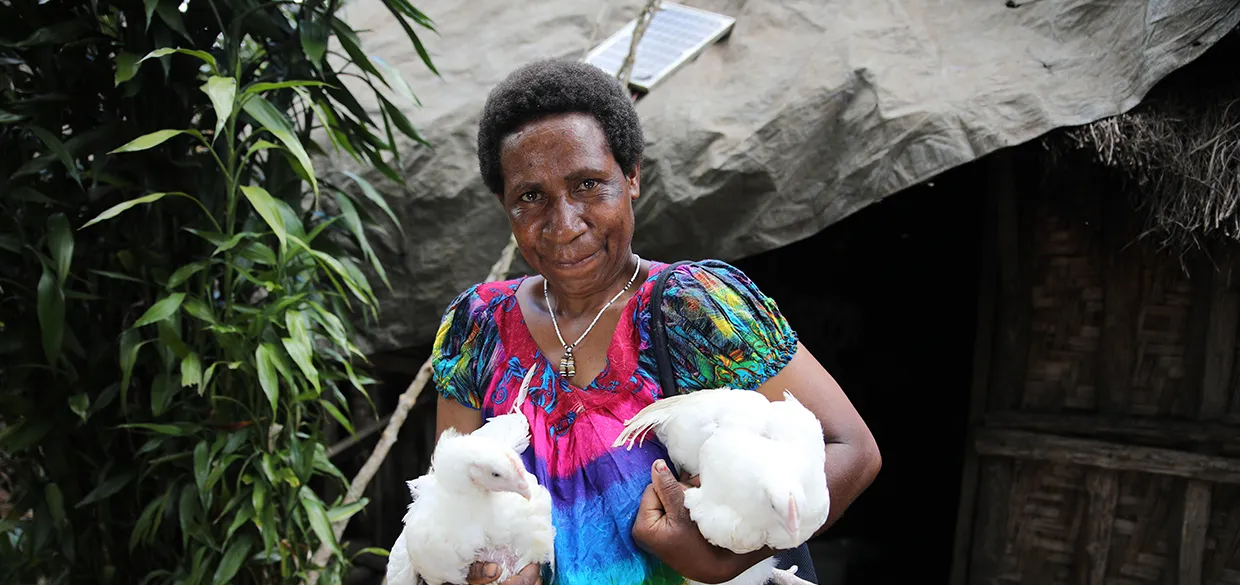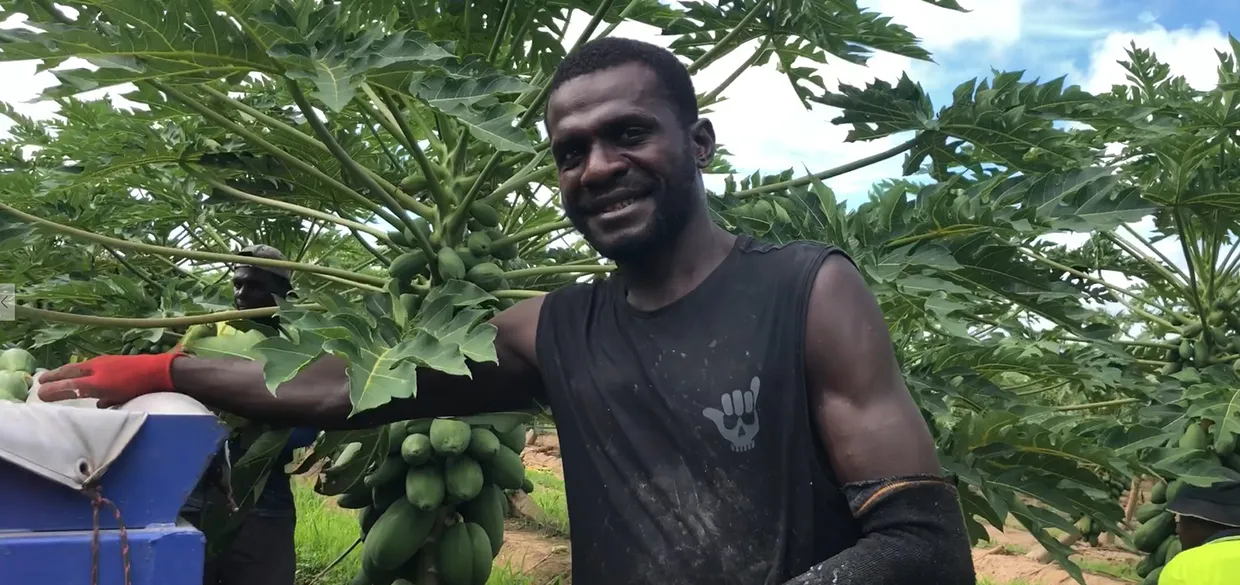Frequently asked questions
- Must be between the age of 21-40
- Must be tuberculous free.
- Must be able to speak and understand English.
- Must be presentable.
- Must be motivated to do well.
- Must have a birth certificate/NID card.
- Must have a current and valid passport.
- Must have a valid visa police clearance (this is a 10 fingerprint process).
Must be fully vaccinated against COVID-19.
Please note you will also need to show that you do not chew betel nut or drink alcohol.
First step
First obtain an NID card or birth certificate, then contact a recruitment hub in your region to apply.
Second step
Recruitment hubs are in districts and provinces around PNG. Each is managed by a recruitment coordinator who will interview you and review your documents.
Third step
If you are suitable, your details will be sent to the Labour Mobility Unit (LMU). The LMU conducts medical, fitness and police checks.
Final step
If you pass these, the LMU will send your details to employers for consideration. The final decision sits with employers, who may also conduct interviews.
There are no fees charged to participate in labour mobility and there are no labour mobility agents in PNG. You must never pay money or give gifts to anyone to participate in the PALM or RSE schemes. The only legitimate payments are for visa medical assessments, passports, birth certificates and visa police clearances. These payments are the responsibility of individual applicants. If you are not sure, ask your recruitment hub coordinator or the PNG LMU.
Applicants must have:
• NID card or birth certificate
• a valid passport or the ability to get one
• visa police clearance
• vaccine card (COVID).
You will need all these documents to be eligible to apply. Your name and date of birth should match across all documents.
PNG passports are valid for five years. It is up to you to monitor your passport expiry date. Your passport must be valid up to six months before any planned travel.
A visa police clearance is valid for 12 months. If your visa police clearance is close to expiry, you should apply for a new one.
Applicant updates come from recruitment hub coordinators. Remember, there are no agents and no fees. People who apply, and candidates moving through selection, do not have to make any payments to progress their application. The only fees payable are for: visa medical assessment, passport, birth certificate (optional -fast-track fee) and visa police clearance. These payments are the responsibility of individual applicants. If you are not sure, ask your recruitment hub coordinator or the LMU.
PNG workers in Australia and New Zealand receive the same workplace protections as citizens of those countries. This includes protections against exploitation, minimum rates of pay and minimum standards of accommodation. The PALM and RSE schemes contain built-in measures that require employers to look after their workers. On the ground support is also provided by country liaison officers, who are employed by the Government of PNG.

Frequently asked questions
Employers must first be approved to recruit through Australia’s PALM scheme or New Zealand’s RSE scheme and should then submit a recruitment plan (RP) via that scheme’s correct channels.
Once the RP is endorsed, employers should contact the LMU to discuss their recruitment needs. Employers provide selection criteria and job specifications and the LMU shortlists candidates from the work-ready pool. Employers can then interview candidates online or do in-country recruitments at their own cost.
The PNG LMU encourages employers to travel to PNG to recruit, as this helps establish employer/worker relationships and gives employers a chance to understand the cultural context of workers. Travelling to PNG also helps build lasting relationships with LMU staff and allows employers to better assess the suitability of candidates.
Please note, the LMU requires a minimum of 5 to 6 weeks from the approval of an RP to mobilise workers.
PNG has the second largest population in the Pacific after Australia, which means employers can build long-term relationships and meet ongoing workforce needs. This large population also serves as a rich talent pool for diverse industries, including meat processing, agriculture and horticulture, fishing and logging. The natural affinity Papua New Guineans have for caring for their elderly means they are also well-suited to roles in the aged care sector.

Frequently asked questions
Labor mobility is when workers can move around between different countries for the purpose of employment. Papua New Guinea has labour mobility arrangements with Australia through the Pacific Australia Labour Mobility (PALM) scheme and New Zealand through the Recognised Seasonal Employer (RSE) scheme.
Labour mobility is demand-driven, which means employers recruit workers according to their workforce needs. To participate in the programs, both employers and workers must be approved by their respective governments and must meet a minimum set of eligibility criteria.
The PNG Labour Mobility Unit (LMU) is an independent unit within the PNG Department of Treasury. It coordinates the Pacific Australia Labour Mobility scheme and New Zealand’s Recognised Seasonal Employer scheme. It is responsible for all recruitments, pre-mobilisation checks and training for the overseas deployment of PNG labour mobility workers.
The LMU provides extensive support to employers participating in the PALM and RSE schemes, including:
- Facilitation of recruitment processes: The LMU streamlines the recruitment process by connecting approved employers with qualified workers who match specific industry needs, experience, and skill requirements.
- Pre-departure briefing and orientation: Prior to deployment, the LMU organises comprehensive training sessions for workers, focusing on workplace culture, job-specific skills, safety protocols, and understanding of contractual obligations and Australian and New Zealand laws and culture.
- Ongoing support and monitoring: Throughout the deployment period, the LMU maintains regular communication with approved employers and workers to ensure that workers settle into their new environment and assist in addressing issues promptly. They provide updates on workers' performance, well-being, and compliance with PALM and RSE scheme requirements.
- Conflict resolution and mediation: In cases of disputes or challenges, the LMU acts as a mediator, facilitating constructive dialogue between employers and workers to ensure fair resolutions and maintain positive working relationships. This can be provided by country liaison officers on the ground, there to support both workers and AEs.
- Welfare and well-being initiatives: The LMU prioritises the welfare of PNG workers abroad, advocating for their rights and ensuring they receive fair treatment and support in foreign workplaces. This assistance is provided by the LMU welfare and wellness officer and country liaison officers, through scheduled site visits to workers.
- Post-placement support: After workers return to PNG, the LMU continues to support their reintegration by offering counselling, career guidance, and opportunities for further skill development or employment locally. This helps ensure that skills obtained in Australia and New Zealand benefit PNG, especially in emerging industries such as manufacturing and downstream processing in the agriculture and livestock sectors.
The Government of Papua New Guinea actively supports labour mobility initiatives through:
Facilitation of PALM and RSE schemes: The PNG Government collaborates with approved employers to facilitate the participation of PNG workers in overseas employment as part of their bilateral agreement with the Australian and New Zealand governments.
Regulatory support: the PNG Government ensures compliance with PALM and RSE scheme regulations and labour laws to protect the rights and welfare of PNG workers abroad.
Skills development initiatives: The PNG Government invests in training and skills development programs to enhance the employability and capabilities of PNG workers participating in international labour markets.
The LMU and recruitment hubs store all information and documents securely. Applicant and workers data is only accessed in support of labour mobility processes such as candidate shortlisting, contract signing and visa application. All candidates will be briefed on the use of their personal information and asked to sign an approval form stating their personal information can be used for agreed purposes. No information from the database can be provided to third parties or family members.

